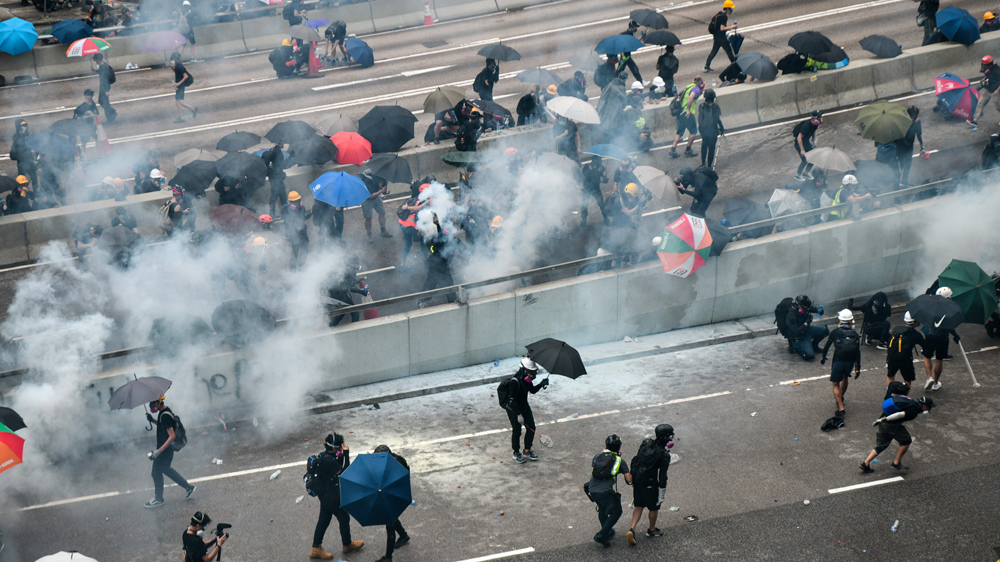Hong Kong protesters tear-gassed after clashes with police
Thousands rally as police fire water cannon against petrol-bomb throwing demonstrators defying a police ban.

Hong Kong, China – Thousands of protesters in Hong Kong took to the streets for a 13th consecutive weekend and clashed with police who fired tear gas and water cannon to disperse them.
Black-clad demonstrators, some carrying crosses, gathered on Saturday at a sports stadium in Hong Kong’s city centre for what they called a Christian rally, before fanning out into the streets and marching towards the police headquarters in central Wan Chai.
Keep reading
list of 4 itemsThe Take: Where are Hong Kong’s protesters now?
Hong Kong’s new security law comes into force amid human rights concerns
Hong Kong passes tough new national security law
While the rally was peaceful earlier in the day, young demonstrators wearing hard hats, gas masks and protective gear later lit barricades on fire outside government headquarters and attempted to storm through before riot police intervened.
Authorities fired blue liquid from a water cannon and bean-bag rounds after demonstrators hurled petrol bombs and rocks into the legislative council compound as blazes burned.
|
|
The march came as police ramped up a crackdown on the months-long protest movement, which was triggered in June by a proposed bill that would have allowed extraditions to mainland China.
The draft law has since been shelved but the protests have continued, with demonstrators issuing five main demands, including the right to elect officials and the resignation of Chief Executive Carrie Lam.
‘More awake’
On Friday night, police detained three legislators hours after arresting several prominent activists including Joshua Wong, one of the leaders of the 79-day Umbrella Movement in 2014.
Wong, who was charged with organising an unlawful assembly in June, was released on bail.
Saturday’s banned rally was called to mark the fifth anniversary of China’s rejection of demands for free elections in Hong Kong, a move that sparked the mass sit-in in 2014.
“Our objective is to have the government respond to us,” said Betty Lam, 23. “Compared with five years ago, now more of us are awake,” she added, referring to Beijing’s 2014 diktat.
Singing hymns and chanting protest slogans, demonstrators marched down the main thoroughfares on Hong Kong Island and spilled into bus lanes.
One of the demonstrators raised a hand-drawn sign that read: “God Free HK from Nazi China.” A handful flew the US and UK flags in a bid for international attention.

Facing the threat of arrest, “I have no fear,” said D Chan, a retired trader in his 50s. “These are the darkest days in Hong Kong for as long as I can remember. The city has descended from the rule of law into dictatorship. The laws are being used as a cudgel against us. That isn’t right.”
Despite turning down the request to hold a march, authorities made preparations by deploying water cannon outside Beijing’s office in Hong Kong, known as the Liaison Office, which has been fortified with two-metre-tall barricades.
Following the police’s decision to outlaw the rally, protesters on Friday began devising workarounds online, calling for prayer meetings – which do not require police approval – as well as mass shopping trips on Hong Kong Island, where government buildings are located.
The protest movement has been largely leaderless, mostly coordinated through online forums such as Telegram and Reddit with established civic groups acting only as intermediaries seeking permission to gather from the police. Any march involving more than 30 people or a gathering of 50 or more people must be approved by authorities.
While the demonstrations have been mostly peaceful, some have devolved into violence with some protesters attacking police stations and government buildings.
Nearly 900 people have been arrested.

There is growing fear among protesters that if Saturday’s rally turns violent, authorities may invoke Emergency Regulations Ordinance, which grants the government sweeping emergency powers, including a ban on all public gatherings and media censorship. The law was codified nearly a century ago following a mass strike.
Some also fear authorities in Hong Kong may call in Chinese troops.
China has slammed the protests, saying they were damaging Hong Kong’s economy and denouncing what it called “terrorist-like” actions by demonstrators.
On Thursday, Beijing rotated thousands of new troops into its garrison in Hong Kong. An editorial in the state-run China Daily newspaper said on Friday that Chinese soldiers have “no reason to sit on their hands” if “the already ugly situation worsens”.